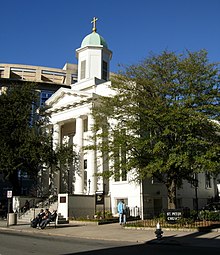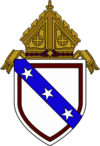
John Joseph Keane was an Irish-born American prelate of the Roman Catholic Church. He served as the archbishop of the Archdiocese of Dubuque in Iowa from 1900 to 1911. He previously served as bishop of the Diocese of Richmond in Virginia from 1878 to 1888.

The Episcopal Diocese of Washington is a diocese of the Episcopal Church covering Washington, D.C., and nearby counties of Maryland in the United States. With a membership of over 38,000, the diocese is led by the bishop of Washington, Mariann Budde. It is home to Washington National Cathedral, which is the seat of both the diocesan bishop and the presiding bishop of the Episcopal Church.

The Diocese of Richmond is a Latin Church ecclesiastical jurisdiction, or diocese, of the Catholic Church in Virginia in the United States. It is a suffragan diocese of the metropolitan Archdiocese of Baltimore.

The Cathedral of Saint Patrick is a cathedral of the Catholic Church in downtown Harrisburg, Pennsylvania, United States. It is the mother church of the Diocese of Harrisburg and is the seat of its bishop. It is a contributing property in the Harrisburg Historic District on the National Register of Historic Places.

St. Patrick's Pro-Cathedral is a pro-cathedral of the Roman Catholic Church in the United States, located in Newark, New Jersey within the Archdiocese of Newark. It was added to the National Register of Historic Places on November 3, 1972, for its significance in architecture, art, religion, and social history. It was added as a contributing property of the James Street Commons Historic District on January 9, 1978.

St. Mary Cathedral Basilica is a Catholic church situated in Galveston, Texas. It is the primary cathedral of the Archdiocese of Galveston-Houston and the mother church of Catholics in Texas, as well as a minor basilica. Along with the Co-Cathedral of the Sacred Heart in Houston, St. Mary's serves more than 1.5 million Catholics living in the archdiocese.

The Cathedral of Saint Thomas More located at 3901 Cathedral Lane is the cathedral of the Diocese of Arlington in Virginia and the seat of Bishop Michael F. Burbidge. The rector of the cathedral is the Very Reverend Patrick L. Posey, who was appointed in June 2019. The cathedral also has a Parochial Vicar, two resident priests, Director of Religious Education, Youth Minister and Music & Liturgy Coordinator.

Augustine Van de Vyver was a Belgian-born American prelate of the Roman Catholic Church. He served as the sixth bishop of the Diocese of Richmond in Virginia from 1889 to 1911.

Thomas Albert Andrew Becker was an American prelate of the Roman Catholic Church. He served as the first bishop of the Diocese of Wilmington (1868–1886) and the sixth bishop of the Diocese of Savannah in Georgia (1886–1899).
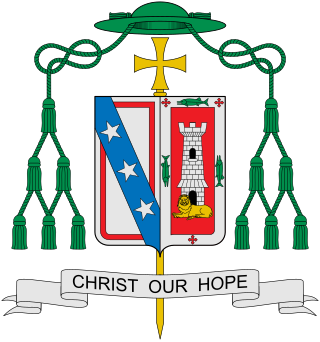
Barry Christopher Knestout is an American prelate of the Catholic Church who has served as Bishop of Richmond in Virginia since 2017.

John McGill was an American prelate of the Roman Catholic Church. He served as bishop of the Diocese of Richmond in Virginia from 1850 until his death in 1872.

Francis August Anthony Joseph Janssens was a Dutch-born prelate of the Roman Catholic Church. He served as bishop of the Diocese of Natchez in Mississippi (1881–1888) and as archbishop of the Archdiocese of New Orleans (1888–1897).

Benjamin Joseph Keiley was an American prelate of the Catholic Church. He served as bishop of the Diocese of Savannah in Georgia from 1900 to 1922.

St. Francis Xavier Church is a historic church at 532 Market Street in Parkersburg, West Virginia.

The Cathedral of the Sacred Heart in Richmond, Virginia, is the seat of the Roman Catholic Diocese of Richmond. The property is located along North Laurel Street at 823 Cathedral Place, facing Monroe Park one block north of Main Street. Construction of the cathedral was begun in 1903, financed by donations of Thomas Fortune Ryan and his wife; it was the only cathedral at that time known to be constructed by the exclusive patronage of a single family.

St. Mary's Cathedral is the cathedral and parish church in the Diocese of Cheyenne located in Cheyenne, Wyoming, United States. It was listed on the National Register of Historic Places in 1974.
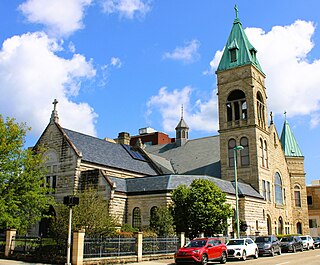
The Basilica of the Co-Cathedral of the Sacred Heart is a cathedral church and a minor basilica located in Charleston, West Virginia, United States. Along with the Cathedral of St. Joseph in Wheeling it is the seat of the Catholic Diocese of Wheeling-Charleston. The parish complex is a contributing property in the Downtown Charleston Historic District on the National Register of Historic Places.
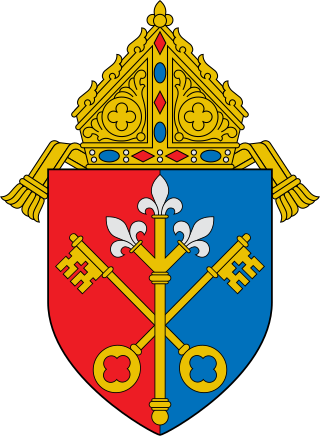
The Personal Ordinariate of the Chair of Saint Peter is a Latin Church ecclesiastical jurisdiction or personal ordinariate of the Catholic Church for Anglican converts in the United States and Canada. It allows these parishioners to maintain elements of Anglican liturgy and tradition in their services. The ordinariate was established by the Vatican in 2012.
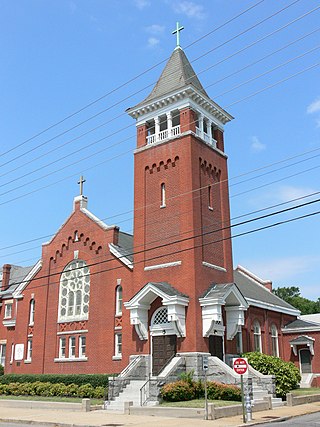
The Church of the Sacred Heart, is a Catholic church in Richmond, Virginia that was built in 1901. The congregation was initially Irish and German.
